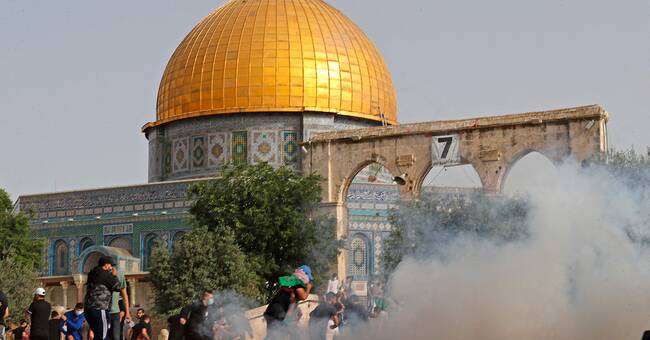As usual, Jewish nationalists today, the so-called Jerusalem Day, want to march through Arab neighborhoods in East Jerusalem to celebrate the conquest of the eastern part of the city in 1967.
At the same time, Israeli plans to evict hundreds of Palestinians from a neighborhood in East Jerusalem and hand over homes to Jews have led to violent protests, all happening at the end of the holy month of Ramadan.
The anxiety is growing
That is why last week's clashes have resulted in hundreds of injured Palestinians, prompting the United States and the United Nations to express concern about continued explosions of violence and criticize plans to evict Palestinian families from homes where they have lived for generations.
Several Arab countries have also, as expected, condemned the Israeli police's presence at one of Islam's three holiest sites during Ramadan, where tear gas, rubber bullets and stun grenades were met with stones, bottles and fires, among other things.
Demonstrations have also taken place in other cities such as Haifa and Nazareth.
The armed Palestinian organizations Hamas and Islamic Jihad say Israel is "playing with fire" and promises revenge if Israel forces Palestinians out of the Sheikh Jarrah district.
The evictions decide
Israel has commanded thousands of police and Jews have been banned from visiting the Temple Mount where the al-Aqsa Mosque is located and where a number of clashes have taken place.
In addition, the Supreme Court has postponed a ruling on whether the evictions of Palestinians from the Sheikh Jarrah neighborhood are legal or not, evictions already approved by a lower court.
Nationalist Jewish groups, however, plan to use the police as a protection to make their usual march on Jerusalem Day, through the Damascus Gate and further into the Muslim parts of the old city, something that could trigger new protests and more violence.
Violence affects everything
For Jewish nationalists, the measures are a setback and if the march is redirected, they will learn to protest against what they consider to be a degenerate policy towards the Palestinians. For Israel, the issue is sensitive both internationally and at home. Relations with the outside world, not least the Arab world, can be seriously disrupted if people are forced out of their homes by the police.
At the same time, the government negotiations are in a sensitive situation where settlers and peace supporters must compromise on a government program when the conflicts on the streets in the last week instead increase the distance between them.
The question is whether the common will to get rid of Prime Minister Netanyahu is enough to stay together.
Of course, Netanyahu wants to survive politically and avoid the risk of being convicted in the great corruption trial that has begun, and perhaps therefore hopes that the charged situation will crack down on the government negotiations.
Javascript is disabled
Javascript must be turned on to play video
Read more about browser support
The browser is not supported
SVT does not support playback in your browser.
We therefore recommend that you switch to another browser.
Read more about browser support
Hundreds are hospitalized - see the clashes in the video player.
Photo: Reuters

